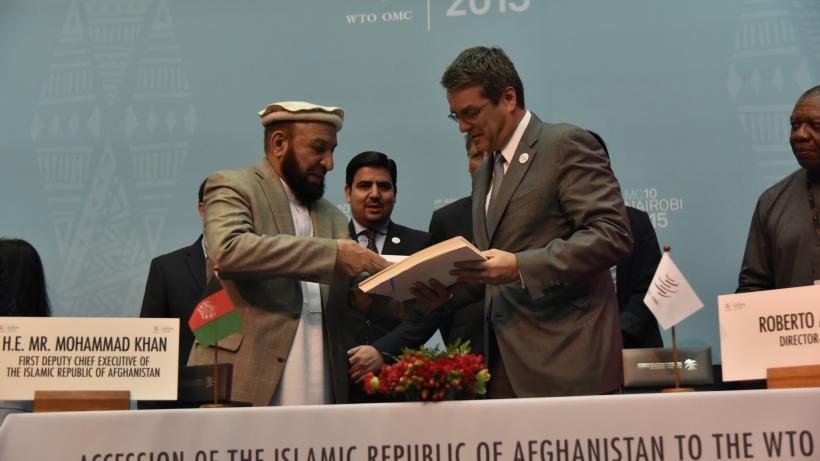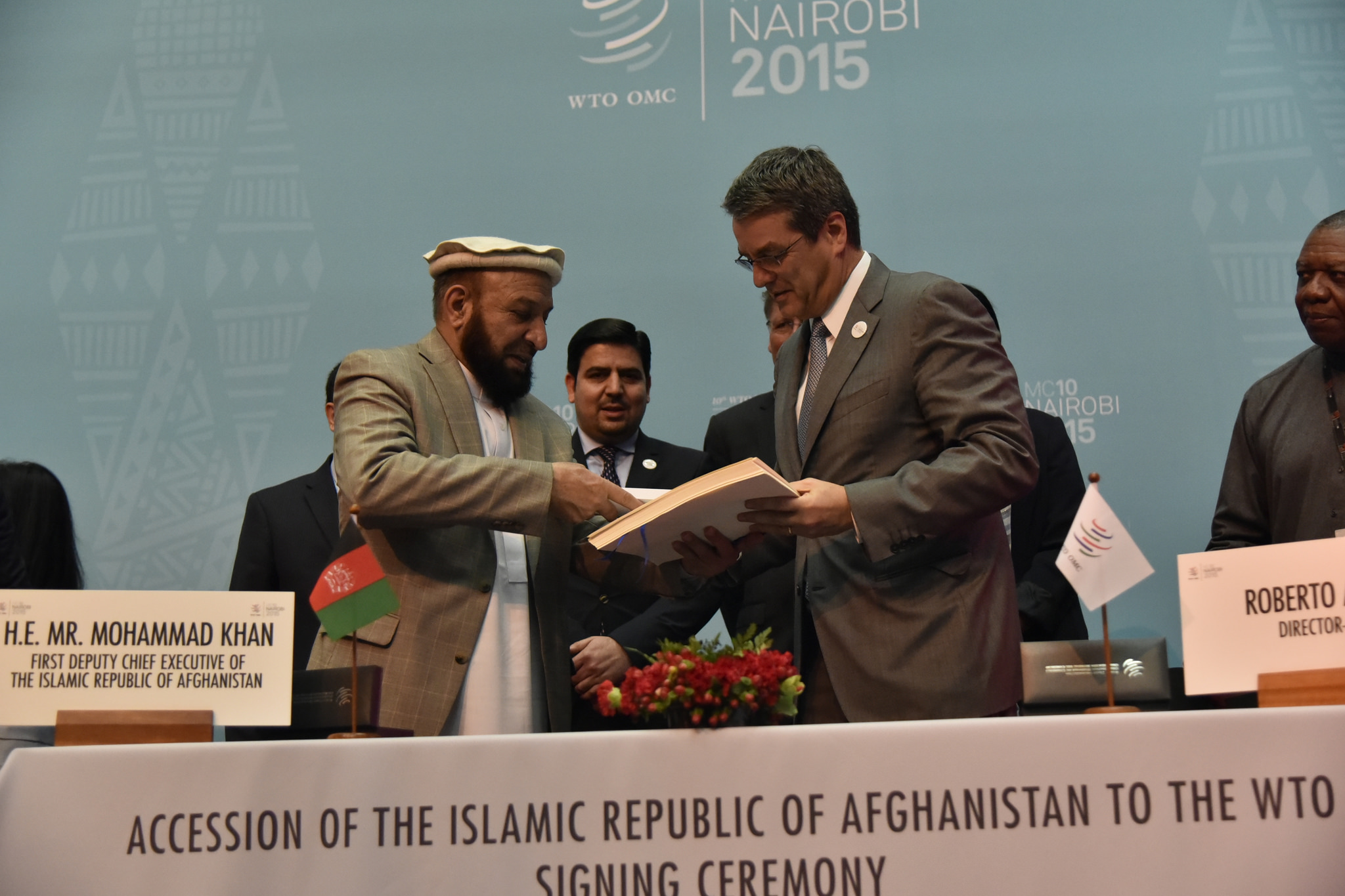
Will WTO membership boost trade and investment in land-locked Afghanistan?
WTO, established in 1995, works to provide a framework for trade policies to ensure freer, easier, and more predictable trade flows. They also provide technical assistance to low-income, developing and least-developed countries in transition to adjust WTO rules. In December 2015, the number of WTO member countries increased to 162. Afghanistan became the 36th least-developed country (LDC) to join the global trade body.
Many other countries, especially LDCs and Landlocked Least-Developed Countries (LLDCs) are still in the process of negotiation to gain accession to the WTO. According to Roberto Azevedo the Director-General of WTO, “many LLDCs are less likely to reap the development benefits that trade and foreign direct investment can bring — and many millions of lives remain bound, needlessly by poverty”. Various research shows that the cost of doing business in LLDCs is 25 -30% higher than transit countries. The reasons for this are that landlocked countries tend to: be more isolated from the global markets, have inadequate infrastructure, and have trade barriers and disputes, among others. It has been realised that these impediments to trade and investments will be solved largely by joining the WTO. Although joining the WTO signals a broader commitment to reform and investment, the question remains, will this help Afghanistan boost its trade and investment?
Afghanistan and the WTO
Since 2001, with the support of the international community Afghanistan has witnessed numerous improvements across sectors. In the sector of trade and investment the introduction of: the Private Investment Law, Business Partnership Law and Law on Business Corporations and Limited Liability Companies, Law on Transit Duty, the establishment of Afghanistan Investment Support Agency (AISA), Afghanistan Pakistan Transit Trade Agreement (APTTA) and Afghanistan joining the South Asian Association of Regional Cooperation (SAARC) are some of the prominent examples to be cited.
More work is still needed, particularly in the sector of security and corruption which are the major concerns for investors and the public. Moreover, these two major issues are the main impediments to the implementation of a more secure rule of law, investment, trade and transit. The National Unity Government (NUG), established in 2014, committed to bring peace, fight corruption and lead the country towards self-sufficiency and economic growth. Despite the government’s struggle, 2015 was the most insecure year in Afghanistan since 2001. In the same year, Transparency International ranked Afghanistan as the world’s second most corrupt country, a downgrading from the previous year.
[caption id="attachment_15571" align="alignnone" width="2048"] Credit: WTO[/caption]
Credit: WTO[/caption]
Despite this, 2015 may have signaled a turning point for Afghanistan’s economy with the inauguration of the Turkmenistan-Afghanistan-Pakistan-India (TAPI) gas pipeline project and its accession to the WTO. TAPI would provide job opportunities to thousands of Afghans, and when/or if it is completed, Afghanistan would earn around USD 400 million per year in transit fees. The government ended almost 11 years of negotiations and Afghanistan signed the protocol of accession to WTO membership in December 2015. President Ashraf Ghani appreciated the support of WTO and stated that, “this is a significant and historic step forward as Afghanistan seeks to build a modern economy”. According to Azevedo, “the membership will help Afghanistan to create new trading opportunities and boost economic development”.
Pros-and-cons of WTO
Afghanistan’s strategic location has historically made the country a valuable trade hub linking South Asia and resource rich Central Asia. Therefore, as a member of WTO, Afghanistan will gain significant progress in trade liberalisation, boosting trade and investment opportunities. This is expected to help Afghanistan improve exports to international markets and protect the country from unfair trade practices by other WTO members. The Afghan Ministry of Commerce and Industries (MoCI) pointed out that, as a member of the WTO, Afghanistan would be able to impose a higher tariff of 2.5 percent on imported products, and would also enjoy tariff concessions from the world’s major economies including the U.S., China, India, and members of the EU. Greater engagement in international markets could spur greater poverty reduction and improve economic stability for the country.
The WTO will provide technical assistance to strengthen the capacity of Afghan counterparts in terms of trade policy and international trading system. Landlocked Afghanistan is more dependent on Pakistan in terms of transit and trade. Therefore, one of the immediate impacts of WTO accession will be to pressure Pakistan to comply with the APTTA, which is currently only weakly enforced by Pakistan. This will improve, and create a safe space on, political and economic issues for both countries.
In order for Afghanistan to significantly benefit from this historic opportunity, the government will need to beef up efforts to secure the peace deal, address pervasive corruption and improve supply chain quality of local products.
Moreover, membership to the WTO would help the AISA to attract and motivate international corporations to investment in Afghanistan. Consequently, greater Foreign Direct Investment would boost regional and international trade. This is only possible when the issue of security and corruption is tackled by the Afghan government.
Opponents of Afghanistan’s accession to the WTO argue that reducing trade tariffs will threaten infant industries that may be unable to compete internationally. This fear could be addressed, in part, by preferential treatment under the WTO framework which would help secure Afghanistan’s domestic industries. Nonetheless, it would only be possible if the government strengthens infant industries and standardises local products. This is not impossible but poses a challenge in the short-run given the difficulty of regulating and enforcing standards.
Afghanistan’s accession to the WTO has considerable advantages in the long-run. However, it is not clear given the currently fragile security situation, how much Afghanistan will benefit from WTO membership in the short-run. It may be that accession will be “putting the cart before the horse”. In order for Afghanistan to significantly benefit from this historic opportunity, the government will need to beef up efforts to secure the peace deal, address pervasive corruption and improve supply chain quality of local products. Furthermore, the MoCI, the AISA, and the Afghanistan Chamber of Commerce and Industries (ACCI) will have to work together to expand trade and investment opportunities.

